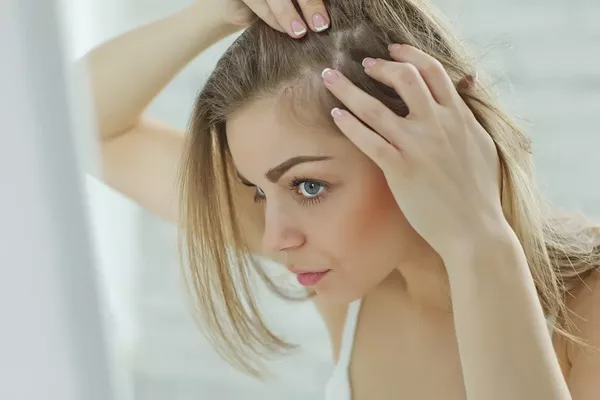Hair loss is a common concern for many individuals, and it often leads to a quest for answers and remedies. In this pursuit, the role of testosterone, the primary male sex hormone, has often been questioned. Some people believe that high testosterone levels are directly responsible for hair loss. However, is there any scientific truth to this claim? In this article, we will explore the relationship between high testosterone and hair loss, delving into the underlying factors and dispelling common misconceptions.
I. Understanding Hair Loss:
Hair loss, or alopecia, can be attributed to various factors such as genetics, hormonal changes, age, and underlying health conditions. The most prevalent form of hair loss, known as androgenetic alopecia, affects both men and women. It is characterized by a gradual thinning of hair on the scalp, resulting in a receding hairline or a more pronounced balding pattern.
II. Testosterone: The Hormonal Link:
Testosterone is an androgenic hormone primarily found in males, although females also possess smaller amounts. It plays a crucial role in the development and maintenance of male sexual characteristics, including the growth of facial hair, deepening of the voice, and muscle mass. Due to its association with masculine traits, the assumption that high testosterone levels contribute to hair loss seems logical at first glance. However, the truth is more nuanced.
III. The Role of DHT:
Dihydrotestosterone (DHT), a potent derivative of testosterone, is the key player in androgenetic alopecia. An enzyme called 5-alpha reductase converts testosterone into DHT, which binds to hair follicles and triggers a process known as miniaturization. This process causes the hair follicles to shrink over time, resulting in finer and shorter hair growth cycles. Ultimately, the hair becomes so thin that it is no longer visible, leading to the appearance of baldness.
IV. Genetic Predisposition:
While high levels of testosterone are not directly responsible for hair loss, the sensitivity of hair follicles to DHT is largely determined by genetics. Individuals with a genetic predisposition to androgenetic alopecia possess hair follicles that are more susceptible to the damaging effects of DHT. Consequently, even normal levels of testosterone can lead to significant hair loss in these individuals.
V. Balancing Act: Testosterone and Hair Health:
Maintaining a healthy balance of hormones is crucial for overall well-being, including hair health. Drastic imbalances in testosterone levels, whether excessively high or low, can potentially impact hair growth. However, it is important to note that hair loss caused by hormonal imbalances is relatively rare and often accompanied by other symptoms such as irregular menstrual cycles, changes in libido, or significant weight fluctuations.
VI. Other Contributing Factors:
While testosterone and DHT play significant roles in hair loss, it is essential to recognize that they are not the sole factors responsible. Other elements, such as age, nutritional deficiencies, stress levels, and certain medications, can also contribute to hair loss. Stress, for instance, triggers the release of cortisol, a hormone that can interfere with the normal hair growth cycle. Additionally, nutritional deficiencies in iron, zinc, biotin, and other essential vitamins and minerals can adversely affect hair health.
VII. Treatment Options:
Addressing hair loss requires a comprehensive approach that takes into account individual circumstances. Various treatment options, such as medications like finasteride and minoxidil, are available to slow down the progression of androgenetic alopecia and stimulate hair growth. Additionally, advanced procedures like hair transplants can provide long-term solutions for individuals seeking to restore their hairline.
Conclusion:
While the assumption that high testosterone levels directly cause hair loss is a prevalent misconception, the reality is more complex. High testosterone levels alone do not cause hair loss. Instead, it is the sensitivity of hair follicles to DHT, a hormone derived from testosterone, that contributes to the onset and progression of androgenetic alopecia. Genetic predisposition plays a crucial role in determining the susceptibility of hair follicles to DHT’s damaging effects.
Understanding the underlying factors involved in hair loss is essential for developing effective treatment strategies. It is important to approach hair loss from a holistic perspective, considering genetic factors, hormonal balance, and overall health. While hormonal imbalances can impact hair health, they are not the sole determinants. Stress, nutritional deficiencies, age, and medications can all contribute to hair loss and should be taken into consideration.
Treatment options for hair loss range from medications that inhibit the conversion of testosterone into DHT, such as finasteride, to topical solutions like minoxidil, which promote hair growth. Advanced procedures like hair transplants offer a more permanent solution for individuals seeking to restore their hairline.
In conclusion, the idea that high testosterone directly causes hair loss is a myth. Rather, the sensitivity of hair follicles to DHT, influenced by genetic factors, is the primary culprit in androgenetic alopecia. Balancing hormones and addressing other contributing factors are key in managing hair loss. By debunking these misconceptions, individuals can make more informed decisions about their hair health and pursue appropriate treatments for their specific needs. Remember, it’s not just about testosterone levels, but a comprehensive understanding of the complex mechanisms involved in hair loss.

